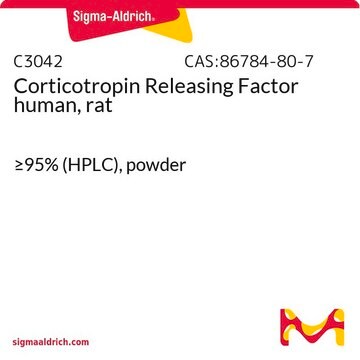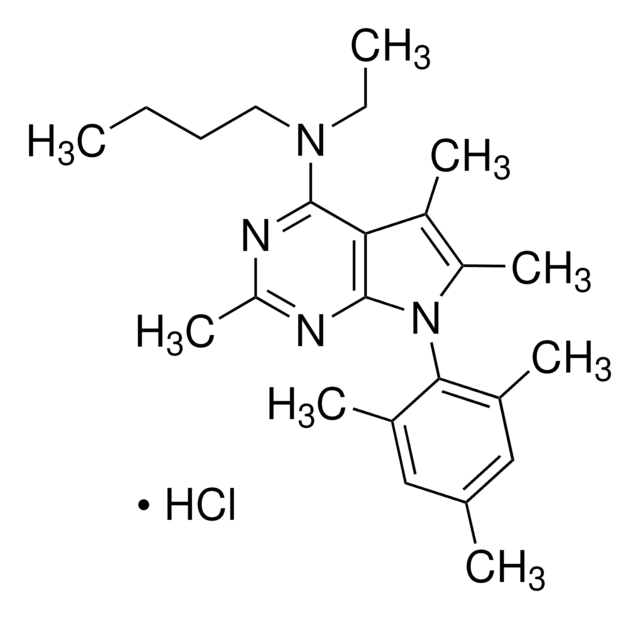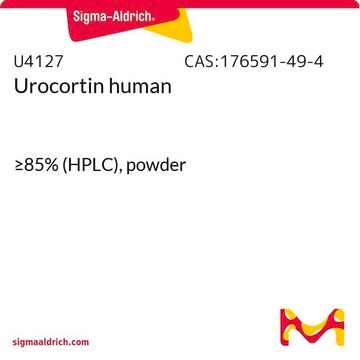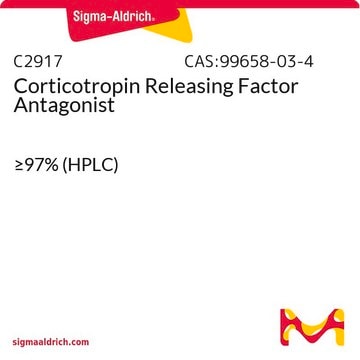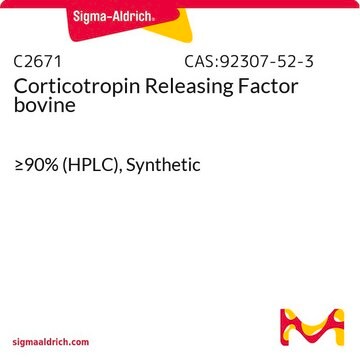U6631
Urocortin rat
≥97% (HPLC), powder
Autenticatiper visualizzare i prezzi riservati alla tua organizzazione & contrattuali
About This Item
Formula empirica (notazione di Hill):
C206H338N62O64
Numero CAS:
Peso molecolare:
4707.26
Numero MDL:
Codice UNSPSC:
12352200
NACRES:
NA.32
Prodotti consigliati
Origine biologica
rat
Livello qualitativo
Saggio
≥97% (HPLC)
Forma fisica
powder
tecniche
western blot: suitable
Solubilità
1% acetic acid: >1 mg/mL, clear, colorless
N° accesso UniProt
Temperatura di conservazione
−20°C
Informazioni sul gene
rat ... Ucn(29151)
Amino Acid Sequence
Asp-Asp-Pro-Pro-Leu-Ser-Ile-Asp-Leu-Thr-Phe-His-Leu-Leu-Arg-Thr-Leu-Leu-Glu-Leu-Ala-Arg-Thr-Gln-Ser-Gln-Arg-Glu-Arg-Ala-Glu-Gln-Asn-Arg-Ile-Ile-Phe-Asp-Ser-Val-NH2
Applicazioni
Urocortin rat can be used for western blotting. The product can also be used for studying that whether CRF receptor type 2 (CRF2) and its high-affinity ligand, urocortin 1 (Ucn1) can mediate sex-specific cellular stress responses by using corticotropin-releasing factor receptor 2-deficient (Crhr2-/- ) and wild-type (WT) mice.
Azioni biochim/fisiol
Binds to CRF receptor types 1, 2α, and 2β; stimulates cAMP accumulation from cells transfected with these receptors. Acts in vitro to release ACTH from rat anterior pituitary cells.
Urocortin is a CRF-related neuropeptide that binds to CRF receptor types 1α, 2α and 2β. It possesses appetite-suppressing effect. Urocortin along with corticotropin-releasing factor (CRF) binding protein (CRF-BP) enhances the free CRF levels in human brain by displacing hCRF from the binding protein.
Nota sulla preparazione
Urocortin rat dissolves in 1% acetic acid at 1 mg/ml to yield a clear, colorless solution.
Altre note
Lyophilized from 0.1% TFA in H2O
Codice della classe di stoccaggio
11 - Combustible Solids
Classe di pericolosità dell'acqua (WGK)
WGK 3
Punto d’infiammabilità (°F)
Not applicable
Punto d’infiammabilità (°C)
Not applicable
Dispositivi di protezione individuale
Eyeshields, Gloves, type N95 (US)
Certificati d'analisi (COA)
Cerca il Certificati d'analisi (COA) digitando il numero di lotto/batch corrispondente. I numeri di lotto o di batch sono stampati sull'etichetta dei prodotti dopo la parola ‘Lotto’ o ‘Batch’.
Possiedi già questo prodotto?
I documenti relativi ai prodotti acquistati recentemente sono disponibili nell’Archivio dei documenti.
Urocortin interaction with corticotropin-releasing factor (CRF) binding protein (CRF-BP): a novel mechanism for elevating "free' CRF levels in human brain.
Behan DP
Brain Research, 725 (1996)
M Spina et al.
Science (New York, N.Y.), 273(5281), 1561-1564 (1996-09-13)
The neuropeptide corticotropin-releasing factor (CRF) is well known to act on the central nervous system in ways that mimic stress and result in decreases in exploration, increases in sympathetic activity, decreases in parasympathetic outflow, and decreases in appetitive behavior. Urocortin
Eric Kubat et al.
Molecular medicine (Cambridge, Mass.), 19, 212-222 (2013-07-10)
Although females suffer twice as much as males from stress-related disorders, sex-specific participating and pathogenic cellular stress mechanisms remain uncharacterized. Using corticotropin-releasing factor receptor 2-deficient (Crhr2-/-) and wild-type (WT) mice, we show that CRF receptor type 2 (CRF2) and its
A De Luca et al.
European journal of histochemistry : EJH, 53(3), 167-176 (2009-10-30)
Urocortin (UCN) is a 40 aminoacid peptide which belongs to corticotropin-releasing factor (CRF) family. This family of peptides stimulates the secretion of proopiomelanocortin (POMC)-derived peptides, adrenocorticotropic hormone (ACTH), beta-endorphin and melanocyte-stimulating hormone (MSH) in the pituitary gland. In the present
Nina C Donner et al.
Progress in neuro-psychopharmacology & biological psychiatry, 96, 109730-109730 (2019-08-16)
The bed nucleus of the stria terminalis (BNST) is a nodal structure in neural circuits controlling anxiety-related defensive behavioral responses. It contains neurons expressing the stress- and anxiety-related neuropeptide corticotropin-releasing hormone (Crh) as well as Crh receptors. Repeated daily subthreshold
Il team dei nostri ricercatori vanta grande esperienza in tutte le aree della ricerca quali Life Science, scienza dei materiali, sintesi chimica, cromatografia, discipline analitiche, ecc..
Contatta l'Assistenza Tecnica.